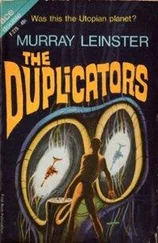On the Esperance, the tow had been pulled alongside and the yacht’s powerful winch hauled it upright. The yacht heeled over from the weight. The crew-cuts fastened the canvas sack in place, and Davis loaded the explosive charge into the iron tube. The crew-cuts cleared the nets. This preliminary operation seemed promising, and it was quite likely that the dredge would operate as it was designed to do.
The Pelorus whistled impatiently. Nick abandoned his job and went below to the short-wave set. He returned shortly after.
“The Pelorus says she’ll be ready to send the bathyscaphe down for a test dive in two hours,” he reported. “She says she will object if our gadget is floating free at the time, on the chance that it might interfere with the bathyscaphe. She asks if you can send our dredge down right away and get it over with.”
“Tell them yes,” said Davis. “In five minutes.”
He compressed his lips. The Esperance’s device, though clumsy, was fundamentally simple. Five minutes later the top of the central spar was level with the water. “Cut away,” said Davis.
Doug slashed the single rope holding the dredge. It sank immediately.
The recorder gave off the sound of waves. Occasionally, very occasionally, a chirping or a grunt could be heard. Twenty minutes. Thirty.
There was a “crump!” from the loudspeaker which reported underwater events. The sound seemed to come from very far below. Even a small amount of explosive makes a very considerable concussion when it goes off so far down, and the shock travels in all directions instead of merely upward. The recorder picked up that concussion as a deep-bass sound.
The sun shone. The wind increased. Waves marched in serried ranks from here to there.
A long, long time later the inflated canvas bag came up and was floating on top of the waves. The Pelorus whistled. Nick went below. A few minutes later he came up again to report.
“The Pelorus says not to cast our dredge adrift. They’re sending the bathyscaphe down unmanned, to test all apparatus before a manned dive. They don’t want any debris in the sea.”
“Tell them we send them a kiss,” snapped Davis, “and they needn’t worry!”
The Esperance approached the floating bag. Jug swung out on the lifting boom and hooked it The winch hauled it out of tie water. The concrete weights were gone. What the nets had captured was not pretty to see. A dead fish with foliated appendages had come up from far below, to judge by what its unpunctured swim bladder had done to it in uncontrolled expansion. Davis said curtly it was Linophrine arborifer, belonging two thousand fathoms below. An angry-looking creature, similarly dead, was Opisthoproctus grimaldi. It belonged deeper than the other. There were other specimens. A genostoma of a species the books didn’t picture; a Myctophum; and various other creatures, mostly as grotesque as their scientific names. All were abyssal fish. They had died while rising from a pressure of several tons per square inch to surface-pressure only.
“It worked,” said Davis curtly. “I almost wish it hadn’t Let it down into the water again. We’ll jettison it when the Pelorus gives us permission.”
Time passed. More time. Still more. The bathyscaphe was now in the water, practically awash. Only a small conning tower showed above the waves. Men swarmed around it.
There came a query from the Pelorus. The Esperance gave assurance that the deep-sea dredge had returned to the surface and would be kept there.
The bathysphere was allowed to sink.
The recorder on the yacht began to pick up deep-toned mooing sounds from the depths.
Presently, the mooing sounds ceased.
Two hours later, waves broke over an object completely awash on the ocean. The Pelorus steamed cautiously toward it. Boats went down from her sides and surrounded the float.
After a long time the Pelorus got alongside and men quickly fastened the huge buoy to the ship. Then the down-wind sea changed its appearance. A reek of gasoline reached the Esperance.
“Something happened,” said Davis dourly. “They’re dumping the gasoline—not even pumping it aboard. Let’s get out of the stink.”
The Esperance beat to windward. The Pelorus began to lift something large and ungainly out of the water. The Esperance went downwind to take a look at it.
The yacht went past no more than fifty yards away, just as the bathyscaphe left the water and swung clear.
The bathyscaphe’s conning-tower was gone. It had been torn away by brute force. The three-inch-thick steel globe … Half of it was gone. The rest was crushed. The sphere, which had been designed to resist a crushing pressure of ten tons per square inch, had been ripped in half! It had been bitten through. Bitten!
There was no comment by anybody on the Esperance.
Half a mile from the oceanographic ship, Davis said in a peculiarly flat voice, “Cut away the dredge. We won’t try to use it again.”
Someone slashed the inflated canvas bag. It collapsed. Somebody cut away a rope. The free dredge sank, slowly. It would never come up again.
The Esperance changed course. She headed north by west There was still no conversation at all. The yacht seemed to tiptoe away from the scene of the bathyscaphe’s destruction.
A long time later, Deirdre said tentatively, “Have you been making guesses, Terry?”
“Guesses, yes,” he admitted.
“Such as?”
“Your father denied that the dredge was designed to stir up whatever gathered the fish together and then carried them down to the bottom of the sea. I was right there with him in the denial, but that’s what we intended, just the same. We said we didn’t believe there was anything there, so it couldn’t do any harm to poke it. We poked, all right! Our dredge, and then the bathyscaphe…”
“But what…”
“And a bolide fell right there a couple of nights ago,” said Terry irrelevantly. “I wonder what the entity on the ocean-bottom thought of the bolide. Hm.” He paused. “I wonder, too, what the bolide thought of what it found down there. Is that too crazy for a sane man to think, Deirdre?” She shook her head.
“Why is my father working on this business?” she asked. “And why are the boys helping, and why do radar stations tell us what they find out, and why did the Philippine Government ask the Pelorus to make a bathyscaphe dive at just that spot?”
Terry blinked at her.
“Too crazy for official notice, eh?” he said, “but too dangerous not to check up on! Is it absolutely certain that the bolides are bolides?”
“No.”
“Thanks,” said Terry. He pursed his lips as if to whistle. “I’ve been thinking of this thing as a puzzle. But it isn’t. I’m very much afraid it’s a threat!” He paused. “Y-y-es. I’ve just made a new guess. It adds everything together. I do hope it’s wrong, Deirdre! I’ve got cold chills running up and down my spine!”
As the Esperance sailed northward, she looked almost unreal. From a distance she might have been an artist’s picture of an imaginary yacht heeled over in the wind, sailing splendidly over a non-existent ocean. The sky was a speckless blue, the sun was high.
But she was real enough, and the China Sea around her was genuine, and what had taken place where the Pelorus lay now hull-down, stowing a ruined bathyscaphe in her hold, had unquestionably taken place.
Something monstrous and terrible was hidden in the dark abyss below the yacht. The ferocity of its attack on the bathyscaphe was daunting. And ferocity has always, somehow, a suggestion of madness about it. But the humming sound in the sea was not the product of madness. It was a technical achievement. And plastic objects with metal inclusions …
Читать дальше










